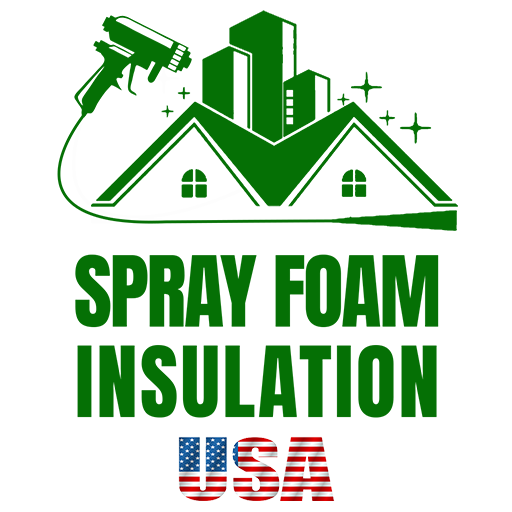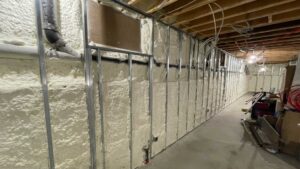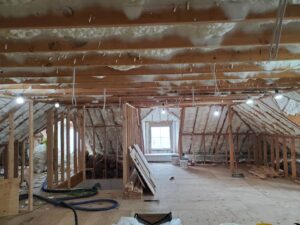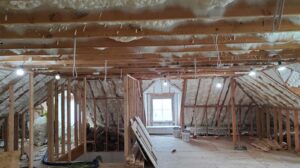Insulation is not just about keeping your home warm in the winter or cool in the summer. It’s about energy savings, comfort, and doing your part for the environment. If you’re looking for quick answers on specialty insulation, here’s the gist:
- Energy Savings: Proper insulation can significantly reduce your heating and cooling costs.
- Comfort All Year Round: High-quality insulation keeps the temperature inside your home more consistent.
- Eco-Friendly Choices: Choosing the right insulation can reduce your carbon footprint.
Whether you’re a homeowner in NY and NJ, or a business owner seeking ways to make your property more energy-efficient and comfortable, understanding the importance and benefits of specialty insulation is crucial. Where energy costs are always on the rise, and the push towards eco-friendly living is stronger than ever, insulation isn’t just a building requirement—it’s a smart investment.
Specialty Insulation encompasses a variety of materials each suited for different needs, from fiberglass and spray foam to eco-friendly options like cellulose. The right choice depends on several factors, including your specific insulation needs, the climate you live in, and your budget. But one thing remains constant: the value of expert installation and high-quality materials.
Let’s dive into specialty insulation, exploring how different types can enhance your comfort, save you money, and contribute to a healthier planet.

Types of Specialty Insulation
When it comes to keeping your space comfortable and energy-efficient, not all insulation is created equal. Specialty insulation includes a variety of materials, each with unique properties and applications. Let’s break down the most common types.
Fiberglass
Fiberglass is one of the most widely used insulation materials. It’s made from fine glass fibers and is available in batts, rolls, or loose-fill. Its popularity stems from its affordability and effective thermal resistance. However, it requires careful handling to avoid irritation of skin and respiratory systems.
Mineral Wool
Also known as rock wool or slag wool, mineral wool is made from natural or synthetic minerals. It offers excellent fire resistance and sound dampening properties, making it a great choice for areas needing extra protection or noise control.
Cellulose
Cellulose insulation is eco-friendly, made from recycled paper products treated with fire retardants. It’s often used in attics and walls and can be blown-in, offering a tight fit in irregular spaces and around obstructions.
Natural Fibers
Insulation made from natural fibers like cotton, sheep’s wool, and hemp is gaining popularity for its environmental benefits. These materials are renewable, biodegradable, and often treated to be fire and pest resistant. They provide good thermal and acoustic insulation.
Polystyrene
Polystyrene comes in two forms: expanded (EPS) and extruded (XPS). Both are rigid foam board insulation with high moisture resistance, making them suitable for below-grade applications like basement walls and foundations.
Polyisocyanurate (Polyiso)
Polyiso is a type of foam board insulation known for its high R-value per inch. It’s often faced with a foil layer to act as a radiant barrier, making it ideal for roofs and exterior walls.
Polyurethane
Polyurethane foam is available in spray form, expanding to fill gaps and creating an airtight seal. It has a high R-value and is excellent for hard-to-reach areas, though it’s more expensive than some other options.
Perlite
Perlite insulation is made from volcanic glass that is expanded and then crushed into a fine powder. It’s often mixed with gypsum or cement for use in insulating concrete blocks and panels. Perlite is non-combustible and provides good sound dampening.
Spray Foam
Spray foam insulation, either open-cell or closed-cell, offers high R-values and creates a moisture and air barrier. It’s versatile, fitting into odd shapes and spaces, but requires professional installation.
Exterior Insulation and Finish System (EIFS)
EIFS is a type of cladding that provides exterior walls with an insulated, water-resistant, finished surface. It’s a system that combines insulation board with a water-resistant base coat, reinforced mesh, and a textured finish.
Each type of specialty insulation has its place, depending on the specific needs of your project. Whether you’re looking for thermal resistance, fire protection, or soundproofing, there’s a material that fits the bill. Understanding the properties and applications of these materials can help you make informed decisions to enhance the comfort, efficiency, and safety of your space.
Remember that the right insulation can make a significant difference in your energy bills and environmental impact. Choose wisely and consider consulting with a professional to determine the best specialty insulation for your needs.
In the next section, we’ll explore the benefits of specialty insulation in more detail, highlighting how it can contribute to energy efficiency, cost savings, and more.
Benefits of Specialty Insulation
When we dive into specialty insulation, we uncover a treasure trove of benefits that extend far beyond just keeping our homes and buildings warm in the winter and cool in the summer. Let’s break down these benefits into simple, easy-to-understand points.
Energy Efficiency
At its core, specialty insulation is designed to be a barrier against the loss or gain of heat. This means that during those cold winter months, the warmth stays in, and during the scorching summer days, the cool air remains inside. By reducing the demand on heating and cooling systems, specialty insulation makes your space more energy-efficient. This isn’t just good for your wallet; it’s also great for the planet.
Cost Savings
Who doesn’t like saving money? By improving energy efficiency, specialty insulation directly impacts your utility bills, leading to significant cost savings over time. Imagine using less energy to maintain a comfortable temperature in your home or office. Less energy used equals less money spent. It’s that simple.
Environmental Impact
By now, it’s clear that using less energy not only saves money but also reduces your carbon footprint. Specialty insulation contributes to a healthier planet by decreasing the amount of fossil fuel needed to heat and cool our buildings. Every square foot of insulated space counts towards a greener Earth.
Noise Attenuation
Noise pollution can be a real headache, literally. Specialty insulation materials can act as a sound barrier, reducing the transmission of noise from outside to inside and vice versa. Whether it’s the hustle and bustle of city traffic or the loud machinery in an industrial complex, insulation can help keep the peace.
Fireproofing
Safety first! Some specialty insulation materials are designed to resist fire, slowing down the spread of flames in case of a fire outbreak. This added layer of protection can be a lifesaver, providing those crucial extra minutes to evacuate safely and potentially reducing property damage.
Freeze Protection
For pipes and water systems, the risk of freezing and subsequent damage can be a real concern in colder climates. Specialty insulation wraps these vulnerable components in a protective embrace, preventing freezing and helping to maintain consistent water flow regardless of the temperature outside.
By embracing specialty insulation, you’re not just making a choice for comfort; you’re also investing in safety, sustainability, and savings. The importance of selecting the right insulation for your specific needs cannot be overstated. With a myriad of options available, from fiberglass to spray foam, the right insulation can transform your space into a more efficient, safer, and quieter environment.
In the next section, we’ll delve deeper into understanding R-values, a critical factor in choosing the most effective insulation for your needs.
Understanding R-Values
When we talk about insulation, “R-value” is a term that pops up a lot. But what does it really mean, and why is it so important? Let’s break it down in simple terms.
Thermal Resistance
At its core, the R-value measures thermal resistance. Think of it as a superhero shield against temperature changes. The higher the R-value, the stronger the shield. This means more resistance to the flow of heat. In winter, it keeps the warmth inside; in summer, it keeps the heat out.
Conductive Heat Flow
Heat moves in three ways: conduction, convection, and radiation. Insulation mainly deals with conductive heat flow – the way heat moves through materials. A high R-value insulation slows down this movement, making your home more energy-efficient.
Insulating Effectiveness
So, how does this all translate to insulating effectiveness? Imagine wearing a thin t-shirt in a snowstorm versus a thick, insulated winter coat. The winter coat, like high R-value insulation, provides much better protection against the cold. In your home, effective insulation with the right R-value acts like that winter coat, surrounding your space with a layer of warmth in the winter and cool in the summer.
But here’s the catch – not all spaces are the same, and neither are their insulation needs. Different parts of your home will require different R-values for optimal efficiency. For example, attics often need higher R-values than walls because heat rises and can escape more easily through the roof.
A higher R-value means better insulation, but it also means a higher cost. It’s about finding the right balance for your specific needs and climate. In colder regions, investing in higher R-value insulation makes more sense because it will keep your home warmer and save on heating costs.
Understanding R-values is crucial in selecting the right insulation. It’s not just about picking the thickest or most expensive option. It’s about matching the R-value to your home’s specific needs to ensure comfort, energy efficiency, and cost savings.
As we continue exploring specialty insulation options, keep in mind the importance of R-values. They are the key to unlocking the full potential of insulation in enhancing your home’s energy performance.
Next, we’ll explore how specialty insulation works to trap air, reduce heat transfer, and enhance comfort and efficiency in your home.
How Specialty Insulation Works
When we talk about specialty insulation, we’re diving into a world where science meets comfort, and where efficiency shapes our living and working spaces. Let’s break down the magic behind it.
Trapping Air
At the heart of specialty insulation is its ability to trap air. Imagine trapping tiny, invisible balloons in your walls, attic, or around pipes. These balloons don’t let heat or cold pass through easily. This is because air, when not moving, is a poor conductor of heat. Specialty insulation materials, like spray foam or fiberglass, create a maze for air, trapping it and reducing the ability of heat to move in or out of your space.
Reducing Heat Transfer
Heat loves to move. In winter, it tries to escape from your warm home to the cold outside. In summer, it tries to sneak in. Specialty insulation acts like a superhero, blocking heat’s path. Reducing heat transfer is crucial, and it’s achieved through materials with high R-values—a measure of resistance to heat flow. The higher the R-value, the better the material is at keeping heat where you want it.
Enhancing Comfort
Ever worn a thick, fluffy jacket on a cold day? That’s what specialty insulation does for your home. It wraps your space in comfort, keeping temperatures steady and enjoyable. No more hot or cold spots in different rooms. Enhancing comfort means your home feels just right, whether it’s freezing or scorching outside.
Improving Process Efficiency
For businesses, improving process efficiency is where specialty insulation shines. In industries where temperature control is vital—think manufacturing or food processing—insulation ensures machines work within optimal temperature ranges. This not only saves energy (and money) but also prevents wear and tear on equipment, extending its lifespan.

By understanding how specialty insulation works—trapping air, reducing heat transfer, enhancing comfort, and improving process efficiency—you can see why it’s a critical investment for both homes and businesses. It’s not just about saving energy; it’s about creating spaces where we can live and work comfortably and efficiently.
Remember that the right specialty insulation solution depends on your specific needs. Whether it’s keeping your attic cozy, protecting pipes from freezing, or ensuring your HVAC system runs smoothly, there’s a specialty insulation product designed for the task.
Specialty Insulation Solutions for Different Needs
When it comes to insulation, there’s no one-size-fits-all. Different areas of your home or commercial building have unique requirements. Let’s dive into some specialty insulation solutions tailored for specific needs.
Attic Insulation
The attic is a critical area for insulation, as it’s where most heat loss or gain occurs. The Duck® brand offers an easy-to-use, flexible, and lightweight cover that seals attic stairway openings year-round. This means blocking drafts and retaining room temperature becomes a hassle-free task. It’s like putting a warm hat on your house during winter and a cool cap during summer.
Pipe and Water Heater Insulation
Pipes and water heaters are often overlooked, yet they’re vital for energy efficiency and preventing damage. Self-sealing covers are a game-changer for insulating both hot and cold pipes. They prevent winter freezing and summer sweating, ensuring your systems run efficiently without the risk of damage from extreme temperatures. It’s like giving your pipes a weather-appropriate jacket, ready for whatever the forecast brings.
HVAC System Insulation
HVAC systems are the heart of comfortable indoor environments. But, without proper insulation, they can be inefficient. Duck® brand’s durable tape combines the protective benefits of aluminum with superior adhesive qualities. This ensures your HVAC ducts are sealed tight, reducing energy loss. Additionally, outlet and switch seals can be fitted tightly behind faceplates, minimizing drafts and enhancing overall system efficiency. It’s akin to sealing all the tiny leaks in a ship, ensuring smooth sailing regardless of the weather.
Custom Fabrication Services
Sometimes, off-the-shelf solutions just don’t cut it. That’s where custom fabrication services come into play. Whether it’s insulation lamination, die cutting for any size of opening, sound control, or creating thermal barriers, specialty fabrication can meet any project’s specifications. This bespoke approach ensures that no matter how complex or unique the insulation need, there’s a solution that fits just right, like a tailor-made suit designed to impress and perform.
In summary, specialty insulation is about finding the perfect fit for your specific needs. From keeping your attic snug to ensuring your pipes and HVAC system are protected from the elements, to custom solutions that match your exact specifications, the right insulation makes all the difference. With these targeted solutions, you’re not just insulating; you’re enhancing comfort, efficiency, and protection against the elements. As we explore further into specialty insulation, the goal is always to create spaces where we can thrive, no matter the conditions outside.
Specialty Insulation for Commercial Buildings
When it comes to commercial buildings, the right insulation isn’t just about keeping warm in the winter or cool in the summer. It’s about meeting energy codes, saving money, and creating a comfortable environment for everyone inside. Let’s dive into the specifics of specialty insulation for commercial spaces.
Energy Code Compliance
First things first, complying with energy codes isn’t just good practice; it’s a necessity. Different areas have different requirements, but the goal is the same: to ensure buildings are energy-efficient and minimize their environmental impact. Specialty insulation plays a key role here. It’s not just about installing any insulation; it’s about choosing the right type that meets or exceeds these codes. This can significantly cut down on energy bills and reduce a building’s carbon footprint.
Metal Building Insulation
Metal buildings can be tricky. They conduct heat and cold more easily than other types of structures, which can lead to higher energy costs. The right insulation can help maximize heating and cooling system efficiency and control condensation, giving these buildings an excellent finish and a more stable internal temperature.
Pole Barn Insulation
Pole barns might have started as agricultural buildings, but today they’re used for much more. Whether it’s a workshop, garage, or storage space, insulating a pole barn properly can transform it into a versatile, comfortable space. And it doesn’t have to break the bank. There are budget-friendly ways to insulate pole barns effectively, making them usable year-round.
GeoFoam
Not all insulation is about keeping warm or cool. GeoFoam is a game-changer for providing stability in construction projects, from roadbeds to landscaping. It’s lightweight, strong, and offers incredible insulation properties, making it an excellent choice for a variety of commercial construction needs.
Basement Wall Insulation
Basements and crawl spaces are often overlooked, but they shouldn’t be. Proper insulation here can prevent moisture problems, mold, and mildew, and make these spaces more usable. Plus, with a variety of economical vapor barrier options available, it’s possible to insulate these areas without overspending.
The goal of specialty insulation is not just to insulate but to do so in a way that meets specific needs, whether it’s complying with energy codes, making a space more comfortable, or ensuring a project’s stability. With the right approach, commercial buildings can enjoy significant energy savings, a reduced environmental impact, and enhanced usability. Keep in mind that every insulation need has a solution, and finding the right one can make all the difference.
Frequently Asked Questions about Specialty Insulation
When it comes to specialty insulation, questions abound. Let’s tackle some of the most common ones to shed light on this crucial topic.
What are the different types of insulation?
There’s a wide world of insulation out there, each with its unique benefits. Here’s a quick rundown:
- Fiberglass: Made from fine glass fibers. It’s common and affordable.
- Mineral Wool: Can refer to rock wool or slag wool. Great for fire resistance.
- Cellulose: Made from recycled paper products. It’s eco-friendly and effective.
- Natural Fibers: Includes cotton and sheep’s wool. Safe and sustainable choices.
- Polystyrene: A type of foam insulation. Comes in sheets or boards.
- Polyisocyanurate: Another foam board insulation, known for its high R-value.
- Polyurethane: Foam spray insulation that expands to fill gaps.
- Perlite: Used in block or board form. Good for high-temperature applications.
- Spray Foam: Expands to create a tight seal, offering excellent air and moisture barriers.
- EIFS (Exterior Insulation and Finish Systems): Provides exterior walls with an insulated, water-resistant, finished surface.
Each type serves different needs, from blocking noise to preventing energy loss.
How much difference does insulation make?
A lot! Proper insulation:
- Saves Energy: Keeps your home warmer in winter and cooler in summer. This can cut heating and cooling costs by a significant margin.
- Increases Comfort: Reduces drafts and hot spots in your home.
- Environmental Impact: Less energy use means lower carbon emissions.
- Noise Reduction: Especially with specialty products designed for soundproofing.
- Moisture Control: Helps prevent mold and mildew by managing condensation.
In short, the right insulation makes your home more comfortable and energy-efficient, while also saving you money.
What do you mean by R value?
The R-value is a measure of insulation’s ability to resist heat flow. The higher the R-value, the better the insulation’s effectiveness. It’s like a rating system for how well an insulation type can keep heat in (or out).
- Higher R-value = Better Insulation: This means it does a great job at slowing down the transfer of heat.
- Varies by Material: Different insulation materials have different R-values. For example, spray foam typically has a higher R-value than fiberglass.
- Application Matters: The effectiveness can also depend on where and how the insulation is installed.
Understanding R-values helps you choose the right insulation for your needs, ensuring you get the most bang for your buck in energy savings and comfort.
With these insights, you’re better equipped to make informed decisions about specialty insulation. The right insulation can transform your space, making it more energy-efficient, comfortable, and even quieter.
Conclusion
In wrapping up our guide to specialty insulation, it’s clear that the choices you make can have a profound impact on your home or building’s energy efficiency, comfort, and overall environmental footprint. From the attic to the basement, and every space in between, there’s a specialty insulation solution that can meet your specific needs.
At Spray Foam Insulation USA, we’re committed to helping you navigate these choices. Our expertise in specialty insulation, combined with our dedication to quality and customer satisfaction, makes us your ideal partner in creating more efficient, comfortable, and sustainable living and working environments.
We understand that insulation can be complex, but we’re here to simplify it for you. With our comprehensive range of services and solutions, from spray foam to custom fabrication, we’ve got you covered. Whether you’re looking to insulate a new construction project, retrofit an older building, or find a unique solution for a specific challenge, we have the skills, knowledge, and products to help you succeed.
Our commitment to excellence is reflected in the positive feedback from our satisfied customers. They’ve seen the difference that quality insulation and professional installation can make, and we’re proud to have played a part in their success stories.
Choosing the right insulation is about more than just filling gaps and adding layers; it’s about making a smart investment in your future. With the right approach, you can enjoy significant energy savings, enhanced comfort, and the peace of mind that comes from knowing you’re doing your part for the planet.
Let us help you make the most of your insulation project. Visit our advantages page to learn more about what we can do for you and to get started on your journey toward a more energy-efficient, comfortable, and sustainable space. Together, we can make a difference, one insulation project at a time.
Thank you for choosing Spray Foam Insulation USA. We look forward to serving your specialty insulation needs and helping you achieve the comfort and efficiency you deserve.





